Five game mechanics legally protected by the companies that made them
Science fiction taught us that clones are cool, but the lawyers disagree.

The games industry is built on the free trade of ideas. A team in America stumbles on a particularly fun way of reloading weapons, which is then replicated in Canada, and improved on in Europe. In the AAA action genre especially, it can feel as if all the major studios are working with the same ingredients: a soup of grappling hooks, parkour mechanics, and gear levelling. Yum.
It's easy to feel cynical about that repetition, but the system works. If a developer stirs in three proven mechanics, then they can usually get away with sprinkingly one genuinely novel idea on top. Even the boldest inventions are usually mixed with borrowed gameplay elements—familiar flavours for players to ingest while adjusting to a spicy new idea.
Sometimes publishers forget all this, however, and file patents that guarantee exclusive use of an idea for decades on end. They won't necessarily enforce them—publishers often build large patent libraries simply to entice buyers, for example. But they're certainly a creative deterrent, ensuring other developers will think twice before swimming in the same soup.
"Come on in," you might say. "The soup is lovely!" And the developers will shift nervously in their swimsuits on the shore, glancing at their lawyers.
Since there's nothing more enticing than forbidden soup, here are some mechanics which, unless their patents have already expired, you're legally not allowed to use. Don't even think about it, buster.
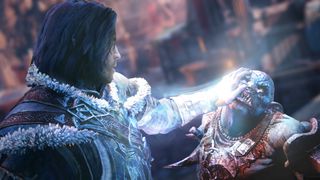
Shadow of Mordor's Nemesis system
This month, Warner Bros managed to push through its US application to patent "Nemesis characters, nemesis forts, social vendettas and followers in computer games". In other words, the shuffling hierarchy of vengeful orcs that made Shadow of Mordor an 85% game back in 2014. That six year gulf gives you an idea of how protracted a process patenting typically is. For years now, Warner Bros will have been going back and forth with the US Patent and Trademark Office, as the latter tested the originality of the Nemesis idea, and Warner tweaked the wording of its application in response.
Now that Warner has succeeded, it's been immediately rewarded with blanket condemnation from the rest of the industry, including Obsidian design director Josh Sawyer, Vlambeer co-founder Rami Ismail, and John Wick Hex designer Mike Bithell. "This is really gross, especially for a franchise that built its brilliant nemesis system on top of a whole heap of mechanics replicated from other games," tweeted Bithell. "As all games do. Because that's how culture and creativity works. Be a better neighbor, WB."
The biggest gaming news, reviews and hardware deals
Keep up to date with the most important stories and the best deals, as picked by the PC Gamer team.
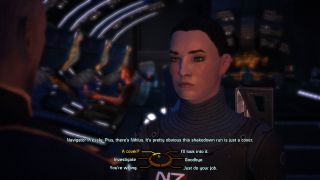
Mass Effect's dialogue wheel
You might know Casey Hudson, Drew Karpyshyn, Ray Muzyka, James Ohlen and Mike Laidlaw as famous Bioware developers, all present during the studio's golden era. But they're also technically inventors, each credited on the patent for what is recognisably Mass Effect's dialogue wheel. It's divided into segments, and each one offers a different choice. Cleverly, Bioware didn't specify a shape—so canny rivals wouldn't be able to get away with a dialogue square or trapezoid.
I'll be honest, lots of these patents are dry reads, but this one is livened up by some diagrams demonstrating past methods of presenting dialogue in games. There's one from the Tex Murphy game, The Pandora Directive, which features two blank mannequins and the line: "Hold it right dere, ya sneakin' peace of slop." It's a real tonal switchup after the legalese, let me tell you.
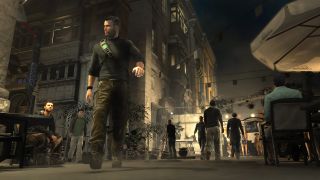
Splinter Cell's Last Known Position
"NEW LEVEL OF ACTION FOR SPLINTER CELL," promises the Steam page for 2010's Conviction. "A full arsenal of cutting-edge innovations allows you to outflank foes with the Last Known Position™ system, [or] tag and eliminate enemies using the Mark and Execute™ feature."
An unregistered trademark symbol (™) tends to only apply to a name, and doesn't hold the power of a patent. But it does function as a warning—telling others that Ubisoft considers those terms to be proprietary, so hands off.
You can see why Ubi in particular might want to protect its ideas, since it gets a lot of use out of them. Last Known Position's silhouette cropped up in a couple of Assassin's Creed games afterwards, and the echo of Mark and Execute can be seen in Ghost Recon's sync shot. If it's not Breakpoint, don't fix it.
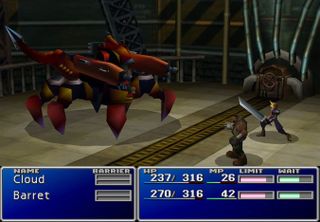
Final Fantasy's Active Time Battle
ATB is a cornerstone of Square Enix's classic JRPG series—an advancement on turn-based combat that took the speed stats of characters into account, so that especially quick enemies could get in extra attacks per turn. It brought real-time tension to what had previously been stolid RPG scraps, and knew it. "The aforementioned [conventional RPG] in which action takes place in turns is a static game and lacks realism," sniffed a 1995 patent, which credited ATB to series directors Hironobu Sakaguchi and Hiroyuki Ito.
Square Enix's ATB patents expired in the early 2010s, at a time when the series had turned its back on the system in favour of various combat experiments. But you can still see ATB's irregular rhythms in Final Fantasy 7 Remake—if it ever comes to PC, that is.
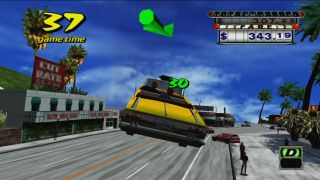
Crazy Taxi's objective arrow
Few noticed when Sega applied for an obscure patent in the late '90s, but they sat up when the company began brandishing it as a weapon. A couple of years after Crazy Taxi hit the arcades—and shortly before it was ported to the PC—Radical Entertainment made The Simpsons: Road Rage, a console-only clone that swapped out the generic, screeching passengers for Springfield's sea captain and Bumblebee Man.
Sega spotted the resemblance and filed an infringement suit in US federal court, which was settled soon afterwards. And no wonder: its patent covered everything from the way pedestrians dodged cars to the giant arrow that pointed drivers to their next destination. Bioshock got away with that last one, though, maybe because patent law doesn't apply in Rapture's notoriously free markets. Say what you like about Andrew Ryan—at least his splicers would have got to play The Simpsons: Road Rage 2.
Most Popular


